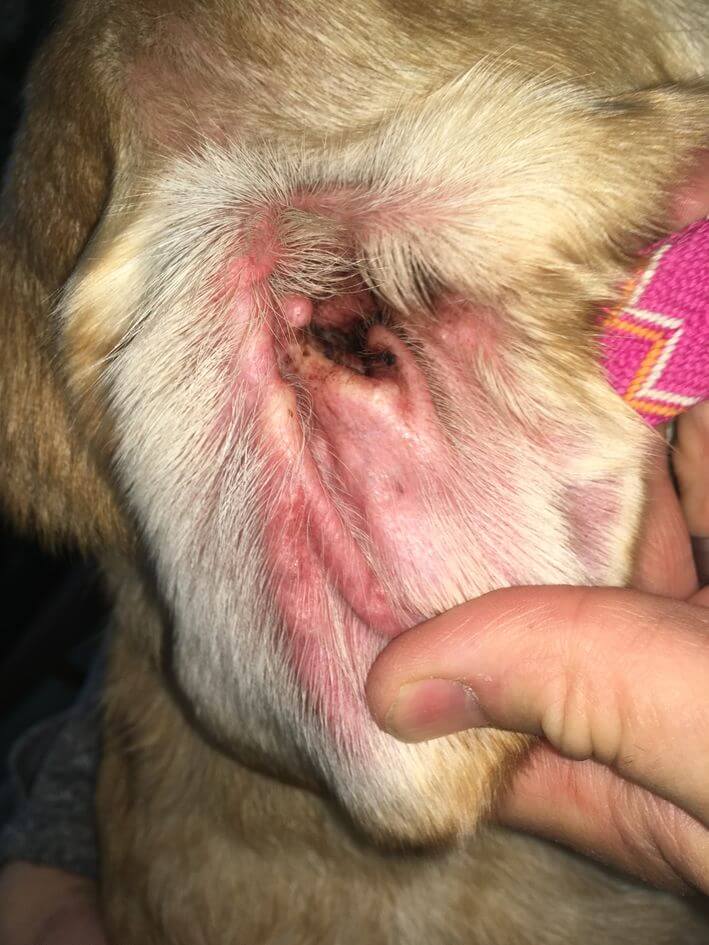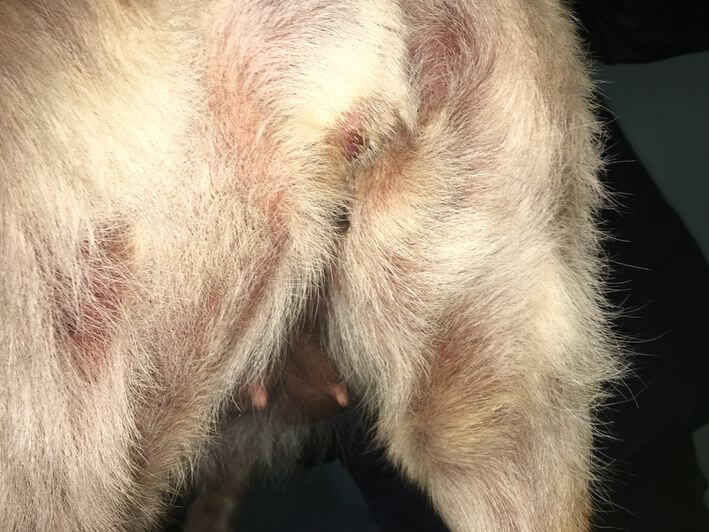Allergies are responsible for many different symptoms in pets and are one of the most common causes for visits to the veterinarian. Pets can exhibit a wide variety of symptoms and differing severities depending on the underlying cause of the allergy. Often pets show signs of being itchy, these include scratching, licking, chewing and rubbing on surfaces. Occasionally pets will have runny eyes and mild respiratory symptoms like sneezing. Most pets have ear and skin symptoms: ear infections, redness between the toes, and/or scooting. The symptoms may be mild and perhaps not easily recognized, while others are more severe.

Environmental allergies, termed atopy, often result in itchy or inflamed skin, hair loss and recurring skin and ear infections. Food allergies may result in similar skin issues as environmental allergies but may also cause gastrointestinal symptoms such as a picky appetite, intermittent vomiting, or diarrhea. External parasites, most notably fleas, may also cause skin allergy symptoms. Skin allergy symptoms if left untreated may then predispose pets to skin and ear infections that often recur if the underlying allergy is not treated. These secondary skin and ear infections then cause even more itchiness.

Environmental allergens are either inhaled or enter to body through the skin. Inhaled allergens usually cause skin symptoms instead of the typically expected sneezing or respiratory symptoms. These allergens can be indoor or outdoor. More common indoor allergens include dust and dust mites. Outdoor allergens are extensive and include all regional grasses, shrubs and trees. Determining the cause of the underlying allergy can be done by testing, but is not the best course of action as we cannot control outdoor pollens well. We have other more successful treatments such as cytopoint or apoquel (see below).
Food allergies are different than environmental allergies but special prescription foods may help both types of allergies. Most people think pet store foods can be used to solve allergy issues. Others think grain free and boutique foods can prevent problems. There is a known link between grain free/boutique foods and acquired heart disease. Proteins in food, not grains or corn cause food allergies. The most common culprits of food allergies in dogs are beef, dairy, chicken, and eggs. One or multiple sources may be the underlying culprit for allergy symptoms. Using hydrolyzed protein foods, these concerns are resolved.
Often times allergies can be a little difficult to pinpoint the exact cause without specific allergy tests. Your pet may in fact have more than one type (seasonal, environmental, food, flea, etc). An accurate history and thorough physical exam are essential to determining if your pet has allergies, as well as diagnosing any secondary infections that also need to be treated. Testing is available for environmental allergies. Intradermal skin testing is the gold standard for allergy testing. Blood tests are also available and although these tests have improved over time, they may still produce false negative results and are shown to be at most 60% accurate.
The treatment options for allergies are as diverse as their causes and treatment may be required throughout your pet’s lifetime. Our veterinarians will work with you to select the appropriate diagnostic and therapeutic plan for their particular allergy symptoms. Treatment for allergies usually consists of immunotherapy, prescription allergy medications, flea medications, medicated topical shampoos and conditioners, prescription diets and nutritional supplements. Treatment for allergies may require a single medication or at times may require combinations of treatment options to provide the best relief from symptoms.
Immunotherapy, also called hyposensitization, involves giving regular injections or an oral solution to desensitize your pet to what they are allergic too. This does require either skin or blood allergy testing first to find out what your pet is allergic too. A lab then creates a solution containing smaller amounts of the allergen which in turn is administered on a schedule to your pet at home in an attempt to minimize the immune response. Improvement is variable and may take as long as 6 to 12 months. Some pets are eventually able to no longer require allergy medications, others may still require smaller dosages of allergy medications, and a few patients may not respond at all.
Apoquel and Cytopoint are the two newest and very effective prescription medications for allergy relief in dogs. These medications allow your pet to avoid the detrimental side effects of steroid therapy. Apoquel is an oral medication that is given daily to reduce allergy symptoms. Improvement often occurs in the first couple days. Apoquel should only be given to dogs more than 1 year of age. Cytopoint is a convenient injection that we administer and typically lasts 30 or more days. Cytopoint may be given to dogs of any age. Improvement also occurs in the first couple days after administration.
Steroid therapy may be needed in certain situations. Oral steroids are much less frequently prescribed now with the availability of Cytopoint and Apoquel. Steroids are often very effective by suppressing the immune response in allergic pets; unfortunately steroids also commonly result in more significant side effects. Observable side effects often include excessive drinking, excessive urinating, excessive hunger and behavior changes. Steroids may also predispose your pet to organ problems, infections and diabetes.
Cyclosporine is another medication used in treating allergies in pets. This medication suppresses the immune system as well but avoids the concerning side effects of steroids. Apoquel and cytopoint tend to be more effective, quicker onset, and don’t have the side effects of cyclosporine.
Antihistamines may be recommended for cats and dogs but are at most 30% effective. Antihistamines may not be reliable in significantly controlling symptoms when used alone and are often more effective if used in conjunction with prescription medications, as it is the prescription medications that have the great efficacy.
Omega 3 Fatty Acid supplements are often prescribed to help reduce allergy symptoms in combination with other treatments. These dietary supplements are given daily and may reduce skin inflammation associated with allergies and thereby improve the effect of other allergy medications. These supplements are often continued for long durations, or in some situations indefinitely, as they require at least 4-6 weeks to be effective. Using over the counter fish oils contain primarily omega 6 fatty acids, which defeat the effects of omega 3 fatty acids. Omega 3 fatty acids have also shown benefits for joint, kidney, and heart disease in addition to the skin benefits.
If you are concerned about your pet possibly having environmental or food allergies, please make an appointment with one of our veterinarians today! Let us help your pet take the itch out of allergies.
